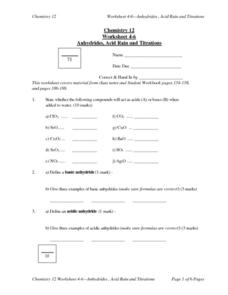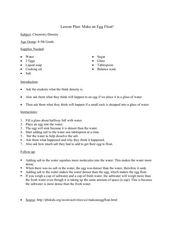Beyond Benign
Daphnia Bioassay LD50
De-icing materials may have a harmful effect on our environment; have your class perform an experiment to test the nature of these effects. Scholars monitor the survival rate of a sample of daphnia as the concentration of a de-icing...
Cornell University
Polymers: Making Silly Putty
Putty is proof that learning can be fun! Share the wonderful world of polymers with your class through an experiment. Young scientists create their own silly putty, then examine its properties.
Curated OER
Introduction to Neutraliization
Students explore acids and bases and the process of neutralization.T hey practice volume measurements and observe the neutralization of an acid
directly through bubble formation and indirectly through indicator color changes.
Curated OER
Introduction to Toxicology
Students explore the science of toxicology and the relationship between a toxic reaction (response) and amount of substance (dose). They observe two demonstrations illustrating the concept of dose-response.
Curated OER
Activity #9 Extending Oil Well Production
Middle schoolers simulate methods used to extend the effective life of an oil well by extracting less available oil. They identify techniques which can be used and evaluate their effectiveness. Pupils are introduced to rock size and...
Curated OER
Teaching about the Effect of Photosynthesis and
Students demonstrate the effects of photosynthesis and respiration. They decide which variables to analyze in a microcosm study. They produce a written paper, oral presentation, poster, or multi-media presentation
Curated OER
Teaching about Aquatic Respiration
Learners explore respiration in a lake ecosystem by experiment and research.
Curated OER
Message in the Bottles
Students identify the three realms of the Arctic Ocean, and describe the relationships among these realms. They explain the relationships between gross primary productivity, net primary productivity, and respiration.
Curated OER
Oxidation: How Can It Be Proved?
Students explore the process of oxidation. In this lesson plan about oxidation, students observe four different demonstrations. Students watch examples of oxidation in order to understand the process. Students discuss the chemical...
Curated OER
Shake It Up
Learners explore the three types of mixtures through the use of interactive video. They experiment making mixtures using a variety of ingredients, while observing, comparing and contrasting, and identifying the types of mixtures.
Curated OER
Density Of A Material
Learners determine the density of a material created in the laboratory and observe physical and chemical changes. They engage in a lab activity, and answer questions on a worksheet imbedded in this plan.
Curated OER
Introductory Lesson on How pH Levels are Determined
Students explore pH levels of different substances. In this lesson about pH, students work together in three to four groups to test substances. moving between three different stations performing tests on the substances to determine...
Curated OER
Polymers-Greaaaaaat Biiiiiig Molecuuuuuules
Students explore polymer properties. In this lesson about polymers, students perform an experiment to understand polymers, their properties, and that they are formed from small molecules. Students role play pretending they are polymer...
Curated OER
An Introduction to Acids and Bases
Students explore acids and bases. In this instructional activity about acids and bases, students do an experiment to test certain items to determine what they are. Students use cabbage and litmus paper as indicators. Students understand...
Curated OER
Hydrology: Flood Mitigation
Twelfth graders discuss the different factors that can contribute to major floods. In this ecology lesson, 12th graders analyze collected rainfall data. They complete a scavenger hunt after the lesson.
Curated OER
Hydrology: Flood Mitigation
Twelfth graders discuss the factors that affect flooding. In this environmental science lesson, 12th graders analyze rainfall data about flooding. They complete a scavenger hunt worksheet using the internet.
Curated OER
Marine Biology Field Trips
Students visit a Marine Biology study area 2-3 times and write a report after the last visit. They participate in the Marine Biology field trips working with lab partners. They complete data sheets to write their primitive environmental...
Curated OER
Investigating Chemical and Physical Changes
Young scholars explore physical and chemical changes by looking at how different powders react to a variety of substances. They observe and identify the difference between physical and chemical change using a mystery powder.
Curated OER
Science Lessons
Tenth graders research about the different cell organelles. In this series of biology lessons, 10th graders compare two allotropes of carbon. They investigate how the rate of reaction is affected by concentration.
Curated OER
The Mole as a Large Number or an Exercise in Dimensional Analysis
Students complete an activity and make "provable estimates." In this dimensional analysis activity students use dimensional analysis and complete an activity.
Curated OER
What is Everything Made of?
Students observe a demonstration on how we see space between water molecules. In this experimental lesson plan students discover what elements make up the things around them and discuss what they learned.
Curated OER
Anhydrides, Acid Rain and Titrations
In this chemical compounds worksheet, students determine is compounds will act as acids or bases when added to water. Students compare basic, acidic, and amphoteric anhydrides. This worksheet has 15 fill in the blank, 2 short answer...
Curated OER
Nothing New? A Physical Change
Fifth graders discuss the differences between chemical and physical changes. In groups, they complete experiments and discover how a physical chnage can be reversed. To end the lesson, they review the steps of the water cycle and...
Curated OER
Make An Egg Float!
Students analyze density. In this density lesson, students experiment with floating an egg. Students discover that salt added to water changes the density of the water allowing an egg to float.
Other popular searches
- Water Chemistry
- Lake Water Chemistry
- Water Chemistry Ions
- Co2 Water Chemistry
- Water Chemistry Lesson Plans
- Ocean Water Chemistry
- Basic Water Chemistry
- Water Chemistry Properties
- Storm Water Chemistry
- Marine Water Chemistry
- Size vs. Water Chemistry
- Water Chemistry Nitrate

























